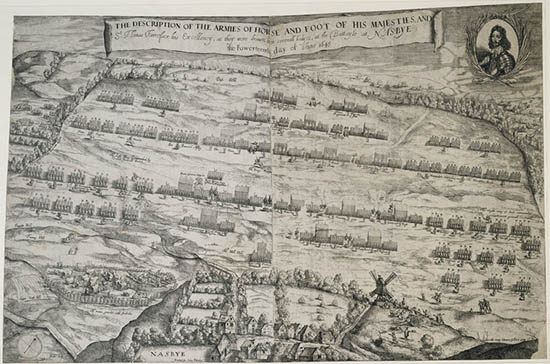14th June 2019
The Battle of Naseby was fought today in 1645, on a foggy June morning. This was an important win for the Parliamentarian army over Charles I’s Royalist army, but it had a particularly tragic aftermath.
Fearing that the Royalists intended to invade East Anglia after their recent storming of Leicester, the Parliamentarian New Model Army abandoned their siege of Oxford and marched into the Midlands to cut them off. With their numbers and confidence swelled by recent reinforcements, the Parliamentarians pressed Royalists back until the King’s army realised escape was impossible and they were forced to turn and fight.
The Royalist army were hugely outnumbered, yet it was they who made the first charge of the battle. Despite a successful initial advance, soon the superior numbers of the Parliamentarian forces began to show. As the Royalists began to retreat, Oliver Cromwell struck a decisive blow to the Royalist infantry. King Charles I himself made an attempt to counter-attack Cromwell’s cavalry but was prevented from doing so when the bridle of his horse was grabbed by the Earl of Carnwath, pulling it to a stop. The earl said to the king, “Will you go upon your death in an instant?” Charles swerved away from his approaching enemies and he and his guard fled in disorder towards Leicester. The Royalist army was decimated – Charles had lost his best commanders, troops, and artillery.
Pursuing the fleeing king’s army, the Parliamentarians found a Royalist camp with around 500 hundred civilian women – wives and supporters of the Royalist soldiers. When the enemy soldiers came upon them, the women cried out in an unfamiliar language.
The Irish rebellion of 1641 was still fresh in the memories of the soldiers, as were the exaggerated accounts of the Protestant deaths that had occurred during it. Since the beginning of the war, it had been claimed that Irish and Welsh women followed the king’s army, and that these women were dangerous. They were witches, it was said, and they carried knives. Thinking that these women were Irish Catholics, the Parliamentarian soldiers cut them down mercilessly. At least 100 of the women were killed, while many others had their faces mutilated.
However the majority of these women were in fact Welsh, not Irish. Much of Wales had declared for Charles, and the wives of the Welsh soldiers had followed their husbands to wash and cook for them. The soldiers had mistaken the women speaking in Welsh for Irish, but it’s likely the truth of who these women were didn’t matter. Despite the fact that attacks on civilians in this war were rare and strongly discouraged, there was little sympathy for the butchered women who were labelled by the Parliamentary press as ‘courtesans’, ‘Irish-sluts’ and ‘witches’. The troops involved went unpunished and the fate of the women has been largely forgotten.

Image: Plan of Battle of Naseby 1645, by Robert Streeter, RCIN 750070, Royal Collection Trust / © Her Majesty Queen Elizabeth II 2019